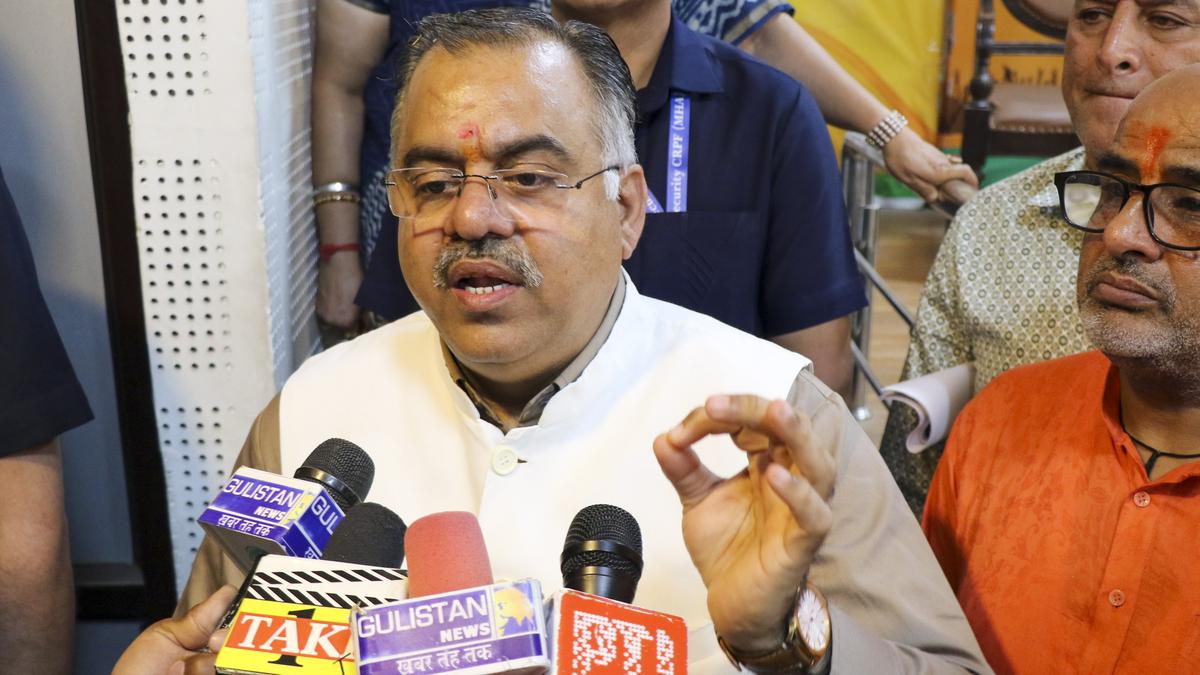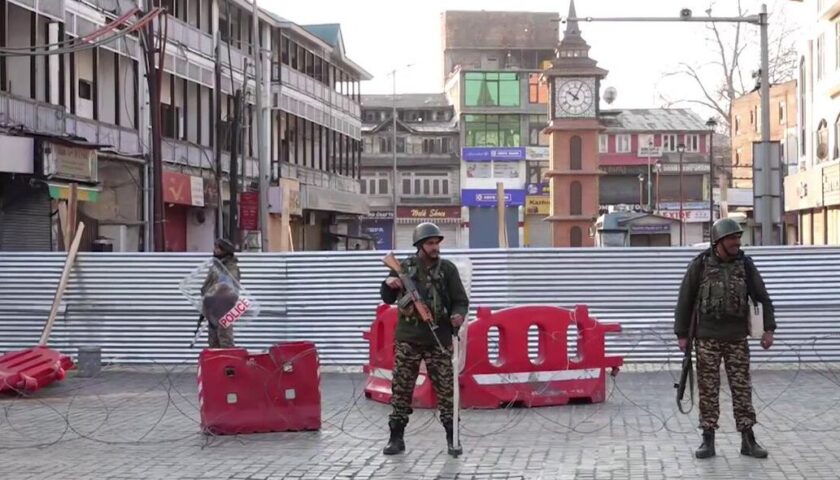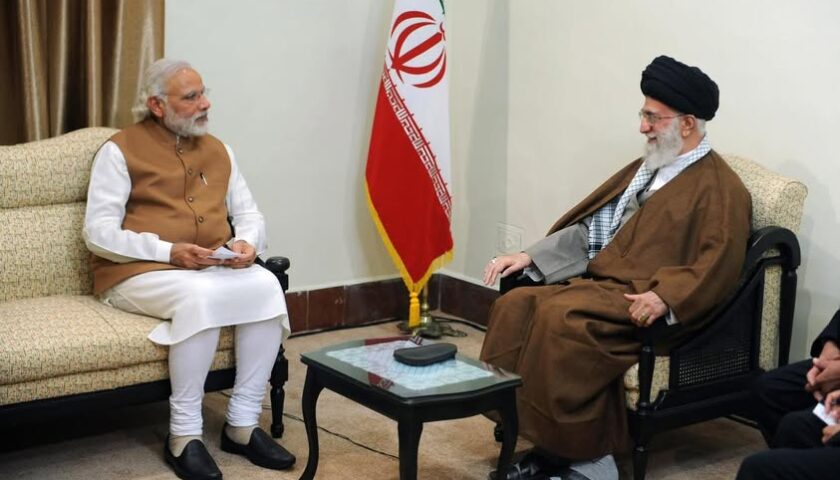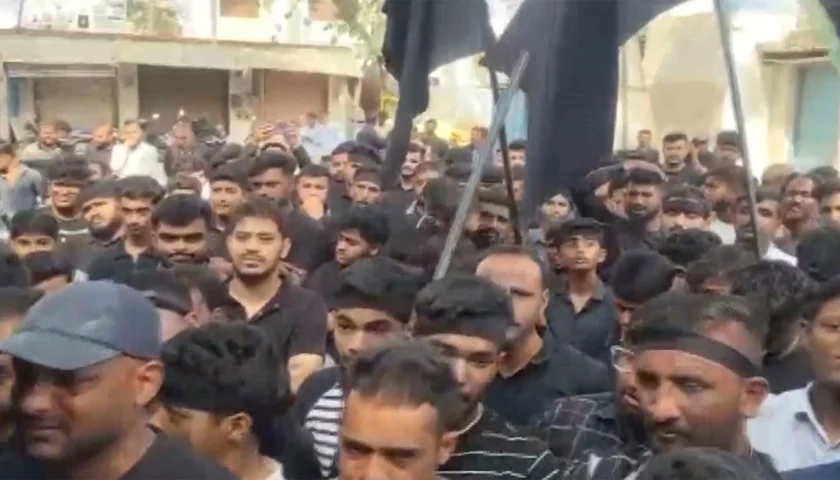Tarun Chugh blasts NC manifesto as “bundle of lies” | J&K politics 2025
By: Javid Amin | 23 October 2025
A Scathing Attack in the Midst of Political Jostling
In a sharp political intervention, Tarun Chugh, national general secretary of the Bharatiya Janata Party (BJP) and its in-charge for Jammu & Kashmir, accused the NC of failing to deliver a single promise from its manifesto. Chugh described the party’s electoral commitments as nothing but a “bundle of lies”. This accusation comes at a time of heightened tension in J&K’s political landscape — marked by internal dissent within the NC, growing discontent in its alliances, and sharpened messaging from the BJP.
The attack is multi-pronged: it targets NC’s governance record, its ideological consistency (especially on issues like Article 370), and its credibility with both its allies and its own ranks. In doing so, Chugh is signalling a strategy beyond mere opposition — a push to fracture the ruling formation’s unity before upcoming legislative contests and pulse-points in the region.
This article unpacks the claims made by Chugh, corroborates them with ground reports, explores internal fissures in NC and its alliances, and considers what this means in the larger narrative of Jammu & Kashmir politics.
The Core Allegation: “Not a Single Commitment Fulfilled”
Chugh’s central claim is straightforward but bold: the NC-led government has not fulfilled a single manifesto promise since assuming power. According to press reports:
“Not a single commitment from NC’s manifesto has been fulfilled.” — Tarun Chugh.
What Are the Alleged Failures?
From his speeches and media coverage, Chugh enumerates several specific promises that he believes remain unfulfilled:
-
The NC had promised “one lakh jobs” for youth in J&K. Chugh asks, “Where are these jobs?”
-
The promise of filling all government vacancies within 180 days is cited.
-
Free home-benefits: six free LPG cylinders and 200 units of free electricity were also claimed in the manifesto, according to Chugh.
The “Bundle of Lies” Phrase
Chugh’s use of the phrase “bundle of lies” is emphatic. At a BJP workers’ meeting in Baramulla, he attacked NC:
“These promises weren’t just promises, they were a fraud on the youth and poor of J&K.”
He further accused the NC of trying to divert attention by raising “cultural invasion” rhetoric against Indian tourists, instead of answering to its failures.
Evaluation and Context
-
Validity of the claim: While Chugh’s numbers (1 lakh jobs, free cylinders, free electricity) map to typical populist electoral pledges, detailed independent auditing or official status reports verifying each commitment are not publicly accessible in full. That means the claim of zero delivery should be treated as a pointed political criticism rather than incontrovertible fact.
-
Political timing: This critique comes ahead of important electoral moments in J&K (by-polls, Assembly time etc.). The messaging is targeted: deployable in media, rallies and among youth disillusioned by unemployment.
-
Governance context: J&K as a Union Territory (post-2019 reorganisation) has unique constraints: Delhi oversight, special status issues, bureaucratic controls. Some delays may be structural—not solely the NC’s fault. That caveat must be kept in mind.
Internal Dissent: The NC’s Trouble Within
While the BJP hammers from without, the NC appears to be facing pressures from within — manifested most clearly in the case of its Srinagar MP, Aga Syed Ruhullah Mehdi.
Mehdi’s Critical Statements
-
In June 2025, ThePrint reported that Mehdi walked out of a party working committee meeting after clashing with the party’s leadership, and criticized the NC’s direction.
-
He has called for the manifesto promises to be honoured, especially on issues like Article 370, and accused his own party of drifting.
-
The Times of India noted that Mehdi publicly accused his party of “begging” for statehood and abandoning the fight for special status.
Implications of the Rift
-
Credibility issue: When a senior MP openly dissents, it damages the impression of party unity and leadership capability.
-
Operational friction: Internal dissent can distract the party from governance and alliance management.
-
Opportunity for BJP: The BJP can exploit such fissures — presenting itself as stable, delivering, and above the intra-party drama.
Why Is Mehdi Dissenting?
Several factors seem to underlie the discontent:
-
A sense of ideological drift: Mehdi believed the NC should focus more aggressively on the restoration of special status (Article 370) and less on mundane governance issues.
-
Perceived dominance of the leadership: Mehdi reportedly asked for greater voice in policy direction, but felt sidelined.
-
Public expectations vs. delivery gap: Being an MP from Srinagar, Mehdi is exposed to direct public grievance and may feel accountability pressure.
Alliance Frustration: Congress Skips Meeting, Signals Strain
Another key dimension of the story is the relationship between NC and its alliance partner, the Indian National Congress (Congress) in J&K. While formally allied, recent actions suggest friction.
What Happened?
-
The Times of India reports that the Congress “skipped a meeting” called by NC for alliance MLAs ahead of the legislative session in Srinagar, citing ill-treatment and signalling discontent.
-
Simultaneously, the Congress also announced that it will not contest the upcoming Rajya Sabha election, blaming NC for refusing it a “safe seat”.
Why Does This Matter?
-
Alliance operational breakdown: If alliance partners stop coordinating, the governing front weakens politically and legislatively.
-
Congress leverage lost or reduced: By skipping meetings and making public complaints, Congress is sending a signal that it expects better treatment, but also risking being labelled a weak partner.
-
NC’s dominance challenged: The NC may have to think not just about opposition attacks (from BJP), but also about keeping its allies motivated and aligned.
Possible Underlying Causes
-
Congress may feel overshadowed by NC in the power structure of J&K, and that its demands (safe seats, representation) are not being met.
-
The internal governance of NC might be perceived as opaque or excessively centralised (especially under the Abdullah family leadership), causing allies and internal members to feel marginalised.
-
With BJP aggressively attacking NC’s performance, Congress may be wary of sharing the fallout and thus distancing itself pre-emptively.
BJP’s Broader Attack Strategy: Beyond Promises to Principle
While the failed promises narrative is front and centre, BJP’s critique also extends to ideological and strategic dimensions.
Article 370 and Historical Narrative
Chugh accused NC of making misleading promises about the return of Article 370, citing party leader Farooq Abdullah’s “100-year timeline” for restoration as proof that NC always knew it wouldn’t happen. While I could not locate a direct quote from Farooq affirming “100 years”, the BJP commentary interprets it that way. This is part of BJP’s attempt to portray NC as historically opportunistic.
Tourism, Culture & “Cultural Invasion”
In his Baramulla speech, Chugh criticised NC for calling tourism a “cultural invasion” (a remark attributed to Aga Ruhullah Mehdi). He argued tourism brings jobs and connectivity, while NC’s rhetoric is regressive.
Historical “Rigged Elections” and Legacy Critique
Chugh went further back, accusing NC of enabling decades of democratic erosion in Kashmir by “manipulating democratic institutions”.
Implications of the Strategy
-
BJP is positioning itself as the party of delivery (jobs, tourism, governance) and contrasting itself with what it calls NC’s “legacy of entitlement”.
-
The attack is calibrated: it mixes governance critique (jobs unfulfilled) with ideological critique (stance on autonomy, culture) and moral critique (legacy of manipulation).
-
By doing so, BJP aims to weaken NC’s base in Kashmir (where identity and status issues matter) and strengthen its hold in Jammu and across the UT.
What Does This Tell Us About J&K’s Political Terrain?
This episode is illustrative of broader dynamics in Jammu & Kashmir politics. A few key take-aways:
1. Governance vs Identity Still a Battleground
While identity issues (Article 370, autonomy) remain politically charged, governance issues such as jobs, vacancies, welfare promises are increasingly prominent in public discourse. The BJP’s attack suggests that the electorate may be primed to ask “What have you done?” rather than just “What have you promised?”
2. Ally Management is Becoming Crucial
For NC, keeping internal unity (like with Mehdi) and alliance coordination (with Congress) is becoming as important as countering opposition attacks. A rift at this level could destabilise the government’s ability to deliver or legislate.
3. Opposition Is Being Redrawn
The BJP is trying to re-frame opposition options in J&K. By calling out NC for failure to deliver and internal dissidence, it is aiming to present itself as the only stable alternative. Meanwhile, the NC must fend off both external attack (from BJP) and internal sabotage (from its own ranks or allies).
4. The Role of Narratives and Reality
Promises and manifestos matter — but only if they are seen to translate into visible outcomes. The “bundle of lies” narrative works politically because many citizens across J&K face unemployment, unfilled vacancies and unmet expectations. For NC, bridging that gap will be essential for its legitimacy.
Potential Risks & Future Scenarios
Let’s consider what might unfold if these dynamics deepen or shift.
Risk to NC
-
If internal dissent grows and is publicly visible (Mehdi, other unhappy MLAs), NC’s stability may be compromised.
-
If alliance partners like Congress continue to perceive marginalisation or fail to stay aligned, the NC-led front may collapse or weaken during key legislative contests or by-polls.
-
Governance failures (jobs, administration, welfare) could convert into voter backlash, especially in youth-heavy areas.
Opportunity for BJP
-
BJP can capitalise on this demoralisation by offering an alternative narrative of delivery and stability.
-
With NC distracted by internal and alliance issues, BJP may gain in by-polls or Assembly strength even without absolutely sweeping victories.
-
A weakened NC could open space for BJP expansion — especially in Jammu or border areas where identity politics is different.
What NC Must Do
-
Demonstrate quick, visible policy wins (jobs, process reforms, regularisation of daily-wagers etc.) to defuse the “unfulfilled promises” narrative.
-
Engage its internal leadership to reconcile dissent and present a united front—especially ahead of critical sessions and elections.
-
Strengthen alliance coordination with Congress (and possibly others) to keep numbers and morale intact.
-
Reaffirm clarity on identity issues in a way that blends integrity (e.g., the value of special status) with governance (e.g., economic development, youth promise).
Jammu & Kashmir NC 2024 Manifesto: Progress Tracker
| # | Promise (Original Wording) | Target Timeframe | Current Status / Progress | Challenges / Notes | Next Steps / Milestones |
|---|---|---|---|---|---|
| 1 | Restore Article 370 & Article 35A; Redraw J&K Reorganisation Act | First year | Minimal / Not fulfilled – No legal reversal or redesign reported | Constitutional and legal hurdles; central government oversight limits action | Advocacy in Parliament, legal drafting, dialogue with Centre |
| 2 | Provide 1 lakh jobs for youth; pass Youth Employment Generation Act | Within 3 months | Partially started / Behind schedule – Reports indicate limited job creation; policy frameworks announced but not fully implemented | Administrative delays, recruitment bottlenecks, bureaucratic hurdles | Fast-track employment schemes, announce phased hiring plans, release quarterly progress report |
| 3 | Repeal Public Safety Act (PSA) 1978; release political prisoners | First year | Limited / No major update | Security concerns, political sensitivities; legal hurdles | Government to issue review of PSA cases, establish timeline for review/release |
| 4 | Six free LPG cylinders per household; 200 units of free electricity for EWS families | Within 6 months | Partial implementation reported | Budgetary allocation and logistics may delay rollout | Issue official circulars; monitor distribution; public communication campaign |
| 5 | Free travel for women in all public transport | Within 6 months | Not implemented / Limited progress | Policy formulation and coordination with transport dept. | Pass legislation/regulations; pilot program in major districts |
| 6 | Dignified return of Kashmiri Pandits; end harassment on highways; ease passport verifications | First year | Limited / Scattered progress | Security environment, community trust deficit, inter-departmental coordination | Form dedicated task force; monitor returnee welfare; integrate feedback from Pandit community |
| 7 | Strengthen Public Distribution System (PDS) | First year | Partial / Implementation ongoing | Supply chain and accountability issues | Digitize PDS, track allocations, improve grievance redressal |
| 8 | Increase pensioner medical allowance to ₹1,000 from ₹300 | Within 6 months | Limited / Some allowances increased | Budget constraints; notification delays | Release official notification; streamline claim process |
| 9 | Marriage assistance schemes for economically weaker sections | Within first year | Unknown / Unclear implementation | Awareness and fund allocation may limit uptake | Official gazette notification; outreach campaign in districts |
| 10 | Establish Minority Commission | First year | Not implemented / Pending | Administrative and legislative hurdles | Draft rules, obtain cabinet approval, recruit members |
| 11 | Regularisation of daily-wager employees & contractual staff | Within first year | Limited / Some notifications issued | Verification process; budget allocation; legal scrutiny | Publish complete list of eligible employees; expedite regularisation notifications |
| 12 | Infrastructure projects in health, education, and tourism | 1–3 years | Partial / Early stage – Some projects announced, construction underway | Budget constraints, project delays | Set milestones for 2025–2026; public progress reporting |
Key Observations
-
High Ambition, Low Delivery: Many promises relate to structural reforms (Article 370, PSA repeal) which are legally and politically complex. Delivery lag is significant.
-
Partial Progress in Social Welfare: Welfare-oriented promises (electricity, LPG, pension allowance) show limited implementation; visibility of execution is low.
-
Internal & Alliance Pressures: Criticism from BJP (Tarun Chugh) and internal dissent (MP Aga Ruhullah Mehdi) highlight accountability concerns and the need for better progress reporting.
-
Need for Transparency: Public dashboards or quarterly “manifesto report cards” could improve perception and track actual outcomes.
Bottom-Line: A Critical Moment for J&K’s Political Landscape
Tarun Chugh’s critique of NC — calling its manifesto a “bundle of lies” — is more than mere election-stage rhetoric. It encapsulates the deep frustration among significant sections of J&K’s electorate, especially youth and aspirational populations, about governance stagnation. Simultaneously, it reflects the BJP’s tactical shift: attacking regional parties not just on identity but on delivery.
For NC, this is a moment of reckoning. It must move from promise-making to promise-keeping, from internal complacency to alliance-management, and from legacy politics to performance politics. For its allies and opponents alike, the signs of change are clear — the political terrain in Jammu & Kashmir is shifting.
In the months ahead, what will matter is not just the rhetoric but the roll-out: jobs, administration, welfare, and the ability of political actors to navigate complex identity, alliance and governance equations. If NC stumbles, the BJP stands ready. If NC responds decisively, it may yet rewrite its current narrative.




